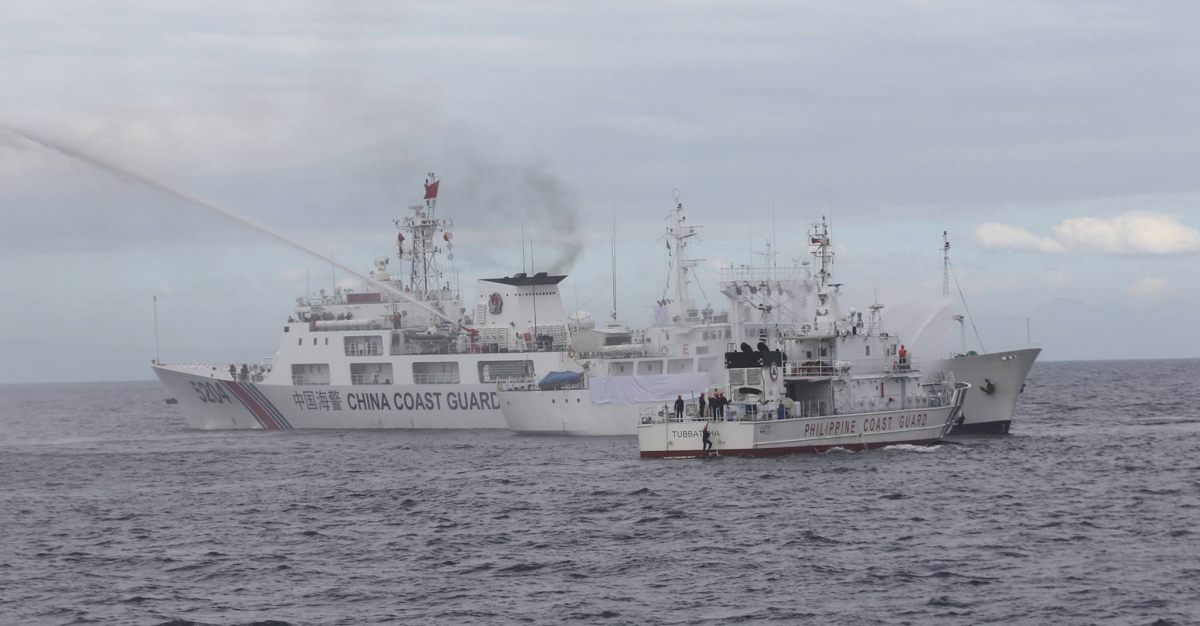Upholding Freedom of Navigation: International Reactions to the Sea Row in the South China Sea
The recent incident in the South China Sea involving the China Coast Guard (CCG) and Chinese Maritime Militia (CMM) vessels, and the Philippine Coast Guard (PCG) and the Bureau of Fisheries and Aquatic Resources (BFAR) has drawn international attention and sparked concerns about the freedom of navigation in the disputed waters. While the United States has expressed its support for the Philippines in upholding freedom of navigation, France and the European Union have opposed any use of force in addressing the sea row.
The United States, through its embassy in Manila, has assured the Philippines of its support in safeguarding freedom of navigation and upholding international law. US Ambassador to the Philippines, Marykay Carlson, condemned the actions of China, stating that they used dangerous maneuvers and water cannons to disrupt a lawful Philippine mission within the Philippine Exclusive Economic Zone (EEZ). She emphasized that the Philippines can count on the United States as a friend, partner, and ally in ensuring the freedom of navigation and adherence to international law.
France, through its embassy in Manila, also expressed concern over the incident in the South China Sea. The embassy reiterated the importance of respecting the United Nations Convention on the Law of the Sea (UNCLOS) and the freedom of navigation. They strongly opposed any threat or use of force contrary to international law and emphasized the need for resolving disputes through dialogue. The French embassy also recalled the decision rendered by the arbitral court in 2016, which invalidated China’s expansive claim in the South China Sea that encroached on the Philippines’ EEZ.
The European Union, represented by its ambassador to the Philippines, Luc Véron, echoed the concerns raised by France. Ambassador Véron highlighted that dangerous maneuvers, water cannoning, and any aggressive behaviors pose a threat to the safety of life at sea, the freedom of navigation, and the prohibition of the use of force or coercion. He emphasized that such actions are against international law and should be condemned.
The international community’s response to the incident underscores the importance of upholding freedom of navigation and respecting international law in the South China Sea. The Permanent Court of Arbitration, based in The Hague, Netherlands, has already made a significant ruling in 2016, invalidating China’s expansive claim in the region. This ruling serves as a reminder of the need to adhere to the principles and provisions of UNCLOS and to resolve disputes through peaceful means.
A Sad Day for Filipino Fishermen: Obstruction of Humanitarian Mission
The recent incident in the South China Sea has had a direct impact on Filipino fishermen who rely on these waters for their livelihood. The China Coast Guard and Chinese Maritime Militia vessels obstructed a Philippine humanitarian mission to provide assistance to Filipino fishermen in the Panatag Shoal (Bajo de Masinloc) area. This act of obstruction has been widely condemned by the Philippine government and has elicited strong reactions from the international community.
The National Task Force for the West Philippine Sea expressed its dismay over China’s actions, stating that it is both shocking and appalling that China would go to great lengths to obstruct a Philippine humanitarian mission. The task force highlighted the significance of this mission, as it aimed to provide food and fuel to Filipino fishermen within the Philippine EEZ. The obstruction of such a mission not only hinders the well-being of Filipino fishermen but also raises concerns about the freedom of navigation in the region.
The transparency policy in the West Philippine Sea (WPS) has allowed members of the press, both local and foreign, to routinely embed in these regular humanitarian and assistance missions conducted by the Bureau of Fisheries and Aquatic Resources. This policy ensures that the activities in the WPS are documented and made known to the public. By inviting the press to witness these missions firsthand, the Philippine government aims to promote transparency and raise awareness about the challenges faced by Filipino fishermen in the disputed waters.
The obstruction of the humanitarian mission not only violates the rights of Filipino fishermen but also highlights the need for a peaceful resolution to the sea row in the South China Sea. The incident serves as a reminder that the freedom of navigation and the well-being of those who rely on these waters should be protected and respected by all parties involved.







